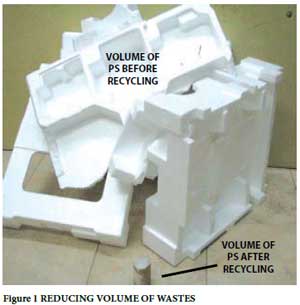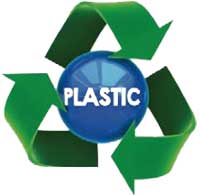 |
 |
 |
|
November 2011
|
Plastic wastes as engineering materialBy Abrahams Mwasha Plastics are manufactured from oil and gas. These are not biodegradable material hence they need to be disposed in landfills, which then for many years pollute ground water. Products made from plastics such as foamed polystyrene, for example, packing materials, insulation, and foam drinking cups are abundant in the outdoor environment, particularly along shores and waterways, blocking drainage. Polystyrene (PS) require large landfill for their disposal, at the same time they should be well conserved against being blown all over by the wind. In initial preliminary analysis of plastic wastes, the author found that polystyrene could be recycled and used as engineering material for different purposes. Secondly, the author found that the large volume of polystyrene can be reduced for easy disposal. Waste management methods vary widely for many reasons, including type of waste material, nearby land uses, and the area available for disposal. There are three methods widely used in the world: disposal methods (landfill and incineration), recycling methods and avoidance or reduction. Disposing of waste in a landfill involves burying waste. Poorly-designed or poorly-managed landfills can create a number of adverse environmental impacts such as wind-blown litter, attraction of vermin, and generation of liquid leachate. Incineration is a controlled combustion process for reducing solid wastes to carbon dioxide, water vapour, other gases and ash.
The process of extracting resources or value from waste is referred to as recycling, meaning to recover or reuse the material. The most common consumer products recycled include aluminum, steel and aerosol cans. Other types of plastic are also recyclable, although not as commonly collected. Plastic recycling is the process of recovering scrap or waste plastics and reprocessing the material into useful products, sometimes completely different from their original state. When compared to other materials like glass and metal materials, plastic polymers require greater processing to be recycled. A mechanical property of recycled PS was conducted. The result of this experiment showed the potential for the using of these materials in construction industry such as wall panels, roof tiles, ceiling and many more.
There are many advantages associated with this proposal
Abrahams Mwasha is a member of the Department of Civil and Environmental Engineering, UWI St. Augustine |

 Methods of waste reduction include reuse of secondhand products, repairing broken items instead of buying new, designing products to be reusable (vegetable fibre bags instead of plastic shopping bags), encouraging consumers to avoid using disposable products.
Methods of waste reduction include reuse of secondhand products, repairing broken items instead of buying new, designing products to be reusable (vegetable fibre bags instead of plastic shopping bags), encouraging consumers to avoid using disposable products. As shown in image above the PS wastes can be reduced by a large amount. This reduction has direct relation on the amount of waste landfill can be reduced by this much.
As shown in image above the PS wastes can be reduced by a large amount. This reduction has direct relation on the amount of waste landfill can be reduced by this much.